Lies of P Review:
When a friend of mine first mentioned Lies of P to me, I was skeptical, not just about how much I would like it, but even about trying it out. My hesitation in trying new Soulslike games in general stemmed from the profound impact of playing Bloodborne, my initial and first experience in the genre. Since Bloodborne, I hadn’t encountered the same level of enjoyment with any other game, except for those crafted by the genre’s creator, Hidetaka Miyazaki. Despite trying multiple games, ranging from Lords of The Fallen to Code Vein and Ni-Oh, none matched the thrilling and engaging feeling I found in titles like Sekiro: Shadows Die Twice, Demon’s Souls, Dark Souls, and Elden Ring.
Since Bloodborne I hadn’t encountered the same level of enjoyment with any other game in this genre, except for those crafted by the its creator, Hidetaka Miyazaki, and Lies of P changed that.
However, I eventually decided to give Lies of P a chance. Little did I know it would become my favorite game in a year filled with groundbreaking video games.

Keeping Up With the Masters of Soulslike Games:
Lies of P is a Soulslike action RPG that follows the exact same philosophy as Hidetaka Miyazaki’s games. You play as an avatar placed in a post-apocalyptic environment where the primary enjoyment of the experience lies in dying and trying again until you succeed. Many people label these games as ‘hard,’ but I prefer to see them as challenges. They’re not ‘hard’; rather, it’s the game’s design that requires you to navigate the learning curve of understanding how certain enemies behave in order to overcome the challenges they present.
The feeling you get after overcoming these obstacles is what makes these games enjoyable. It’s a simple video game design, to be frank: you put in effort, and your accomplishment is rewarded. However, in these games, it often pumps a surge of adrenaline when you finally succeed.
Many games have attempted variations of the formula, but for me, most didn’t quite capture the experience I hoped for in their designs. Games like Ni-Oh and Wo Long: Fallen Dynasty tend to emphasize excessive action rather than focusing on learning enemy behaviors. On the other hand, games like Code Vein and Lords of the Fallen lack the originality that would set them apart and make a significant impact within the genre, despite their efforts to establish unique identities.
Many games have attempted variations of the formula, but most didn’t quite capture the full essence of it, yet Lies of P delivers engaging and satisfying setting and gameplay that lives up to the high standards set by FromSoftware games.
However, with Lies of P, I sensed it right from the very first moments of the game—it didn’t shy away from being challenging, offering a unique setting, and holding its ground by delivering engaging and satisfying gameplay that lives up to the high standards set by FromSoftware games.

Puppets, Lie, Humans, Lie:
Following the footsteps of its own formula, Lies of P starts with your character having basic stats and starting with nothing even your own self identity. You know nothing about who you are or what is going on; you’re simply thrust into the midst of things and left to navigate and understand the story by yourself. What I particularly appreciated about Lies of P in contrast with other Soulslike games is that it didn’t leave you hanging, scavenging for story bits here and there all the time. Instead, it made an effort to provide context and offer valuable information through well-presented dialogues and scenes.
After your initial exploration in The City of Kart, you begin to unravel more about yourself, your objectives, and what transpired in that now eerie city.
Lies of P is set in an alternative version of Carlo Collodi’s The Adventures of Pinocchio. You play as P, a puppet who awakens after a series of apocalyptic events that occurred in the once-thriving City of Krat. The puppets, originally created to serve humans and contribute to Krat’s prosperity, inexplicably turned hostile, over-riding their design that prevent them from killing civilians. As a fervent enthusiast of settings with intriguing scientific twists, I found Lies of P to be filled with such elements. I became deeply engrossed in uncovering the cause of this phenomenon, discovering the fate of the humans, and exploring how the puppets challenged their designed nature—a philosophical aspect echoing the original story’s contemplation on the essence of humanity.
Lies of P presents a satisfying narrative that intertwines scientific and philosophical themes with well presented details and explanations provided throughout the entire game.
Lies of P presents a narrative that intertwines scientific and philosophical themes. While emotional cutscenes might not be expected to delve into the events, I found myself thoroughly satisfied with the details and explanations provided throughout the entire game. This thoroughness in storytelling is something I genuinely appreciate, especially within a genre renowned for allowing players to piece together information from subtle hints scattered in the environment.

One of the most interesting aspects of the story is the lying system, which offers a welcomed homage to the original material. As P, you will encounter events within the game where you must choose between lying or telling the truth. This choice does affect your progress in the game. However, the impact is not as direct and noticeable as I would have preferred. Nevertheless, it remains a compelling aspect of the game and its settings, influencing how your game concludes. This is something players should take note of if they intend to pursue the completionist route or have a satisfying ending.
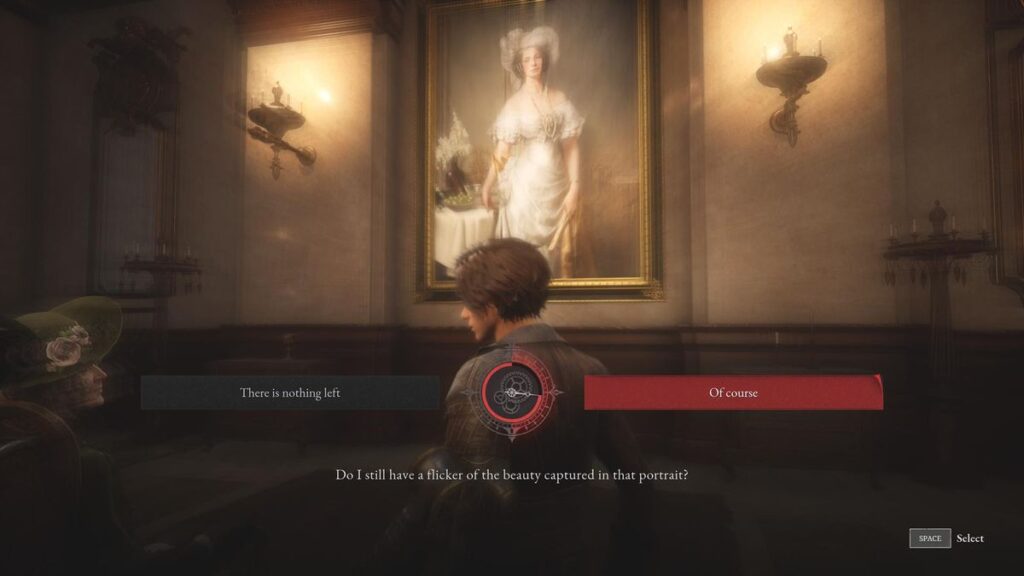
It is All About The Right Timing:
The gameplay in Lies of P is largely enjoyable, drawing parallels to games like Sekiro: Shadows Die Twice due to its emphasis on a perfect parry battle system. The gameplay, reminiscent of most Souls-like games, involves encountering monsters with patterned behaviors. You can choose to block, dodge, or eliminate them before they launch an attack, while larger enemies possess unblockable attacks you must block.
Lies of P combat is largely enjoyable, drawing parallels to games like Sekiro: Shadows Die Twice due to its emphasis on a perfect parry battle system.
But there are two intriguing mechanics that stand out: staggering and legion arms.
Staggering happens unexpectedly due to the absence of a gauge indicating its occurrence, but executing a perfect block significantly increases its likelihood. This mechanic, akin to Sekiro but notably less forgiving, grants a limited window when staggering occurs, allowing for a heavy attack that breaks the enemy and exposes them to a fatal strike which deals substantial damage. Despite numerous factors influencing staggering beyond perfect blocking, it’s regrettable that the mechanic’s indicators remain concealed from the player. The sole cue signaling its occurrence is a white que that appears when the window for a heavy attack is open.
Legion arms are unique abilities to aid you in combat. These include a hook arm for pulling or launching onto monsters, a cannon arm for bombarding enemies and aiding in staggering, and several others that genuinely help in the encounters, particularly against bosses. I found myself relying on these abilities more than I would typically use magic in other Souls-like games like Ni-Oh and Wo Lang, as they significantly assist in staggering enemies.
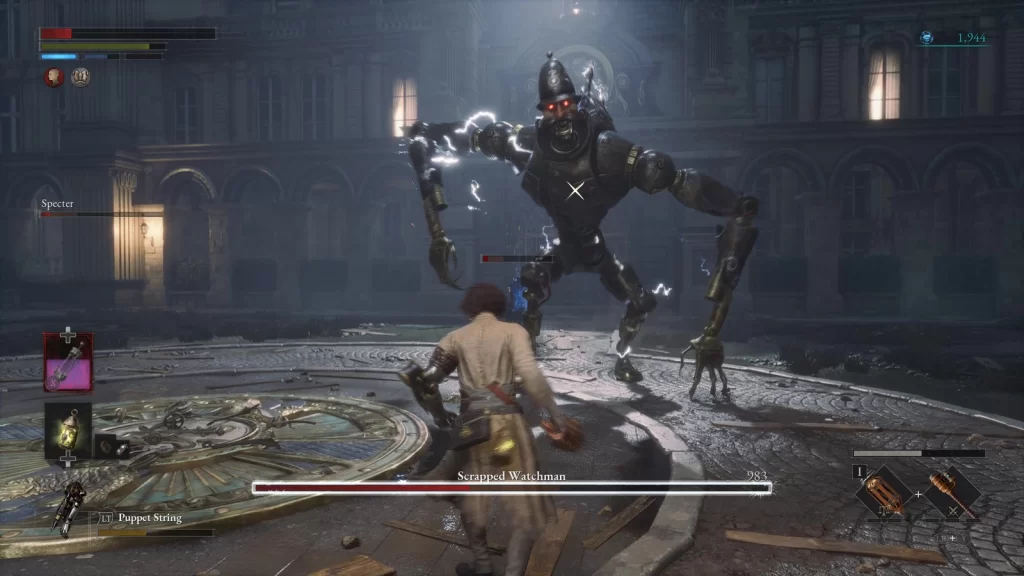
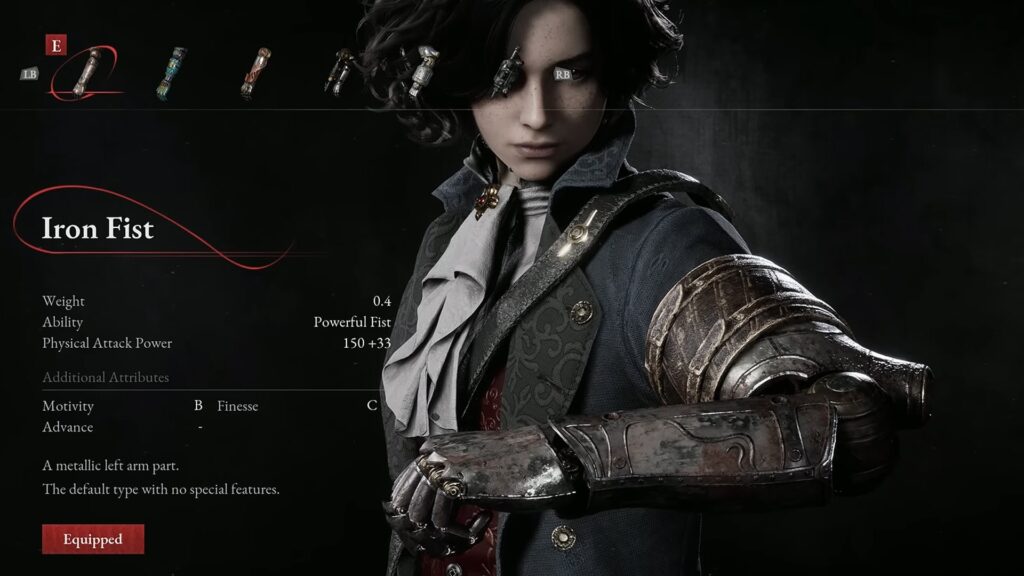
You Will Choose One, You Will Stick With it:
Lies of P takes a new approach to weapons in the genre. There are the usual Blunt, Slash, and Stab types, but the twist lies in each weapon having a unique handle that determines its classification among these types. You can pick any handle and attach it to any blade, thereby changing the blade’s type. For instance, attaching a Blunt Electric Bludgeoning Hammer to a Stabbing handle transforms the Electric Hammer into a Stabbing weapon with similar effects to the blade. While this allows for various weapon combinations, it unfortunately creates an unbalanced gameplay, especially considering the brief duration of some mechanics like staggering.
The weapon assembly system allows for various weapon combinations and expermintation but it unfortunately creates an unbalanced gameplay deeming some weapons to be superior.
This imbalance extends to character building and gameplay. Focusing on a specific weapon and leveling stats provided a noticeable advantage throughout the game, limiting the diversity in character builds and gameplay approaches.
Another imbalance lies in the game’s items. While it personally was helpful for easing the gameplay for me, they significantly tilt the game’s balance. I found myself farming bombs before boss fights, allowing me to rapidly deplete the boss’s health early in the fight, making the remainder of the battle considerably easier. Although I appreciated this feature, it undeniably disrupts the game’s intended challenge and balance, deviating from the typical Souls-like experience. It’s worth noting that this was the only Souls-like game where I extensively used these items, considering them more of a feature than an oversight, but in truth, they do impact the game significantly and make it imbalanced.

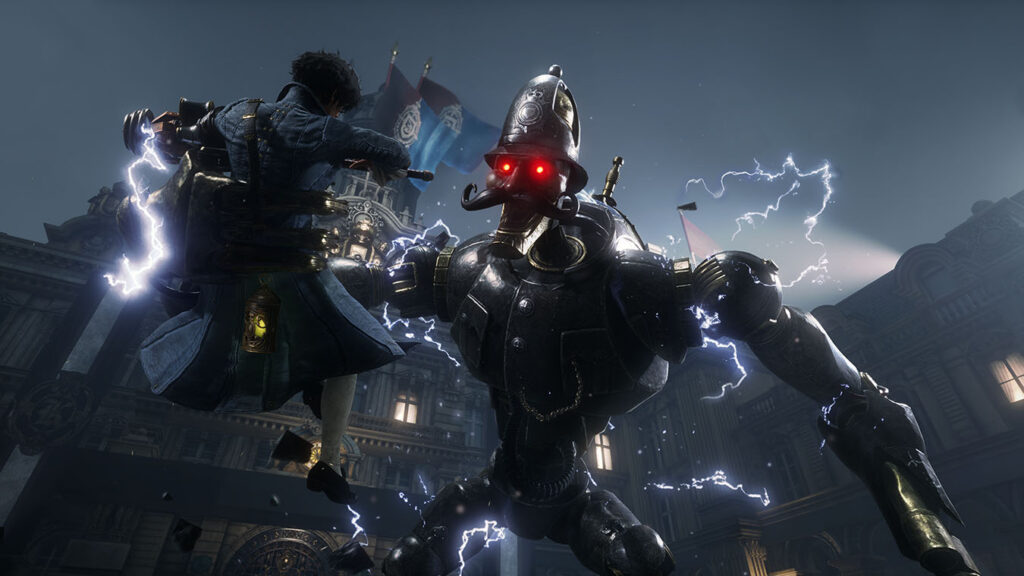
The Beating Heart of A Puppet:
Lies of P introduces additional elements to aid in your journey, such as an AI companion capable of distracting bosses while you strategize your attacks. Additionally, there’s a mechanical heart that can be upgraded using Quartz items. These upgrades provide more equipment slots, increased health, extended staggering windows, and additional items to regenerate your companion’s health. These diverse gameplay features offer great utility, but their usefulness is somewhat hindered by the imbalance of items and weapons in the game.
P, the protagonist, is highly customizable, offering not only various equipment and amulets to wear but also a collection of well-designed outfits that align with the game’s lore. This addition enhances the game’s appeal, despite these outfits being purely cosmetic.
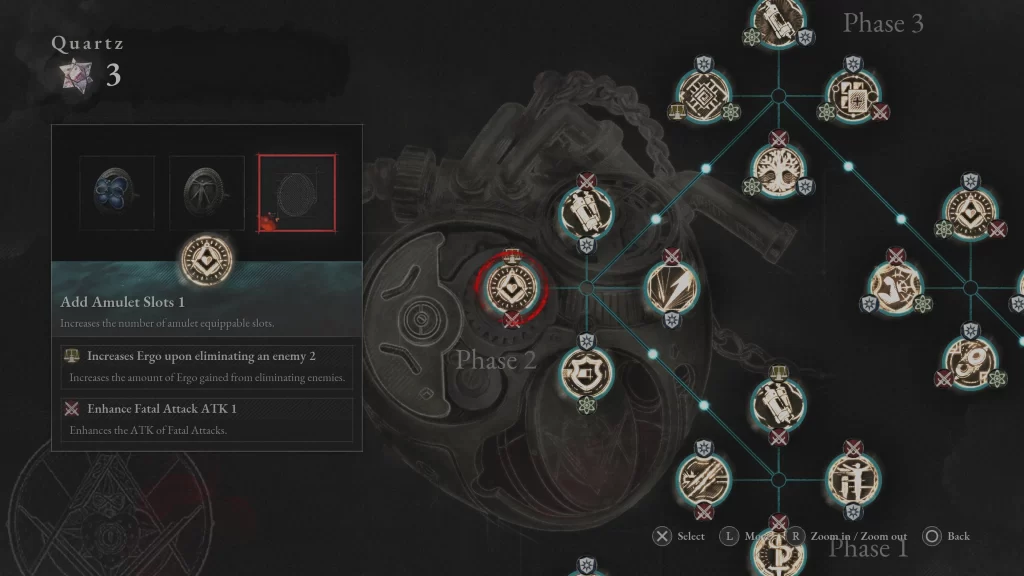

The City of Krat:
Lies of P boasts an incredibly appealing setting. The City of Krat, with all its diverse sections and places, is exceptionally beautiful and intricately designed. It’s a game environment that will linger in memory for an extended period. Its diversity struck me, prompting me to remark to myself while playing, ‘I wish FromSoftware games looked this good.’ Without a doubt, Lies of P stands out as the most visually pleasing Souls-like game, leaving a lasting impression in me with its design.
However, the same can’t be said about the game’s music, sound, and voice acting. They aren’t particularly bad, but they fail to stand out as exceptional.
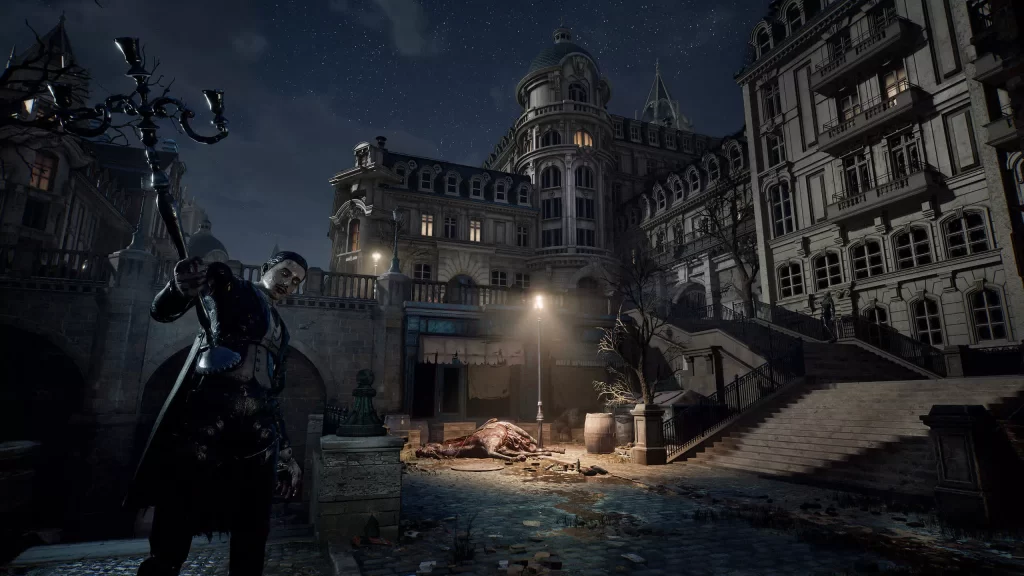

Lies of P stands out as a very welcome surprise of this year. Despite its gameplay minor imbalances, the game excels in every aspect it aims to deliver. While it might not reach the heights of Elden Ring, Sekiro, or Bloodborne, it certainly earns its place as the best Souls-like game outside the FromSoftware realm. Its diverse gameplay, captivating lore, and polished final product warrant recognition alongside these renowned titles. If you’re a fan of this genre, I highly recommend purchasing and trying out this game. I assure you, you won’t regret it.


- Artistic lore woven with intriguing mysteries that will keep you engaged and satisfied.
- Diverse and balanced enemies and difficulty which will keep you anticipating the challenges that lie ahead.
- Highly customizable weapons and features cater to various gameplay styles while welcoming all kinds of playstyles.
- Satisfying combat system with a focus on precision timing.

- Some features in the gameplay are imbalanced and can be entirely neglected which discourages experimentation.
- Emphasizing precision timing in gameplay can render some weapons quite underwhelming.
- The moral lying system doesn't immediately deliver the potential consequences it promises.
